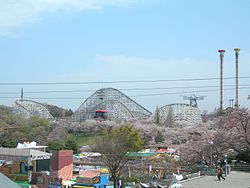| White Canyon | |
|---|---|
 White Canyon at Yomiuriland White Canyon at Yomiuriland | |
| Yomiuriland | |
| Location | Yomiuriland |
| Coordinates | 35°37′33″N 139°31′17″E / 35.625765°N 139.521355°E / 35.625765; 139.521355 |
| Status | Removed |
| Opening date | April 9, 1994 (1994-04-09) |
| Closing date | January 14, 2013 (2013-01-14) |
| General statistics | |
| Type | Wood |
| Manufacturer | TOGO |
| Designer | John Pierce Associates Roller Coaster Corporation of America D. H. Morgan Manufacturing |
| Track layout | Cyclone |
| Height | 116 ft (35 m) |
| Drop | 95 ft (29 m) |
| Length | 3,608.9 ft (1,100.0 m) |
| Speed | 52.4 mph (84.3 km/h) |
| Inversions | 0 |
| Duration | 2:12 |
| Max vertical angle | 53° |
| Capacity | 1,008 riders per hour |
| G-force | 3.5 |
| Height restriction | 51 in (130 cm) |
| Trains | 2 trains with 7 cars. Riders are arranged 2 across in 2 rows for a total of 28 riders per train. |
| White Canyon at RCDB | |
White Canyon (Japanese: ホワイトキャニオン) was a wooden roller coaster located at Yomiuriland near Inagi, Tokyo, Japan. It was one of the first wooden roller coasters in Japan, and one of the largest Cyclone-style roller coasters in the world.
History and construction
Before White Canyon's construction in 1994, there was only one wooden roller coaster, Jupiter (built in 1992), which had ever been built in Japan. This was largely due to strict, earthquake-related building codes which restricted the height of wooden structures in Japan.
White Canyon was built as a collaboration of Roller Coaster Corporation of America, TOGO, D. H. Morgan Manufacturing, and John Pierce Associates. The coaster was built with 2,360 cubic meters (one million board feet) of southern yellow pine and the construction involved extensive prefabrication in the United States before the components were shipped for final assembly at Yomiuriland.
Track layout and ride experience
The layout of the White Canyon was quite similar to the famous Coney Island Cyclone. Before White Canyon was closed in 2013, it was the longest—1,100 metres (3,600 ft)—and tallest—35 metres (115 ft)—Cyclone-layout roller coaster in the world. The ride produced fairly high lateral G-forces of up to 1.5 lateral Gs.
Before it closed in early 2013, a single ride on the White Cyclone cost ¥900. The ride was restricted to individuals who were above 1.3 metres (4 ft 3 in) in height. It was also restricted to riders under 60 years of age and at least in junior high school.
Closure
White Canyon was closed on January 14, 2013. A total of 5.35 million people rode on White Canyon during its 19 years of operation. In its last year of operation, Yomiuriland organized a "White Canyon Thank You" campaign that involved the planting of thousands of trees. The campaign received funding from several environmental and government organizations.
References
- Urbanowicz, Steven J. (2002). The roller coaster lover's companion: A thrill seeker's guide to the world's best coasters. New York: Citadel Press. ISBN 0806523093.
- Wyatt, Mark (1996). White knuckle ride: The illustrated guide to the world's biggest and best roller coaster and thrill rides. London: Salamander Books. ISBN 0517159457.
- Rutherford, Scott (2004). The American Roller Coaster. Saint Paul, MN: MBI Publishing Company. ISBN 0760319294.
- Marden, Duane. "RCDB list of cyclone coasters by length". Roller Coaster DataBase. Retrieved August 29, 2013.
- Marden, Duane. "RCDB list of cyclone coasters by height". Roller Coaster DataBase. Retrieved August 29, 2013.
- ^ "Howaito Kyanion" ホワイトキャニオン [White Canyon]. Yomiuriland Attractions (in Japanese). Yomiuriland. Archived from the original on May 28, 2013. Retrieved August 29, 2013.
- "Yomiuri Rando no kyodai mokuzō kōsutā 'Howaito Kyanion' eigyō shūryō e" よみうりランドの巨大木造コースター「ホワイトキャニオン」営業終了へ [Huge wooden coaster to Yomiuri Land "White Canyon" close of business]. Chofu Keizai Shimbun (in Japanese). Chofu Dottokomu. December 6, 2012. Retrieved August 29, 2013.